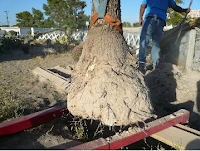 |
| Joshua's old home on Eastern Avenue. Water was cut off five years prior. |
A. These are tough to transplant and this tree was abused and still survived. It shows you how well adapted these plants are to our desert environment if they are not watered too often and carefully relocated.
 |
| Joshua lifted with engine hoist and seatbelts by reader |
The key will be watering with lots of water but not very often or you may rot the trunk and any roots that might grow. I would suggest watering about every two weeks with about ten to twenty gallons in a depression around the trunk.
After the plant shows signs of new growth then the frequency of your watering will dictate how it looks and grows. If you want a Joshua tree with limbs that are long, kind of spindly and solid green then continue watering every two weeks during the summer. I have a hard time aesthetically liking this in appearance I guess because they do not look this way in nature.
 |
| Old soil level just below orange belt. Roots covered with burlap. |
If you want a Joshua tree with a tuft of green growth at the ends of the branches and the rest of the limb brown (more like you see in nature) then don’t put it on drip irrigation. After signs of new growth, begin watering seasonally by hand with a large volume of water around its base. What I mean by seasonally is water deeply perhaps once or twice in the spring, once during the summer and once during the winter. At some future date you may elect to eliminate the summer watering if you want more brown on the limbs.
 |
| Joshua in its new desert landscape. |
Make sure it is staked securely in the soil so the trunk at soil level does not move for one growing season. This plant will respond to a new location if you use soil that has been amended with compost or other soil improvements.
Wetting any part of the aboveground tree with water like spraying it with a hose or mister is a waste of time, not needed and may prove to be detrimental to the plant.
you say watering any part above ground is a waste of time. Out in the desert where do you think the trees get there water from, not a drip system, it comes from the sky, so why would watering anything above ground be a waste of time? Watch one when it rains and you can see the leaves open up to catch all the water they can and absorb into the tree.
ReplyDeleteWhy joshua trees have roots? Which is easier? Watering the roots or using a spray bottle to deliver water to the tree. It is a waste of time.
ReplyDelete